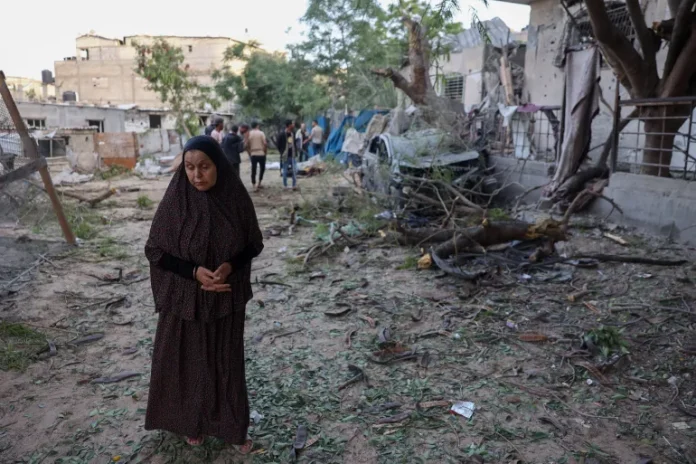The Israeli army continues military attacks on Rafah, killing dozens of Palestinians, while the US and Britain reject an International Court of Justice (ICJ) ruling ordering Israel to halt the offensive.
40 Palestinians were killed in an Israeli attack on a tent camp housing displaced people in Tal as-Sultan camp in southern Rafah, local media reported.
Emergency workers rushed dozens of those injured in the attack to medical centres in Rafiah, but the overcrowded facilities have no capacity to treat the patients, many of whom suffered severe burns.
The Palestinian Authority condemned the “heinous massacre”, saying it marked Israel’s defiance of a UN International Court of Justice ruling ordering a halt to the Rafah offensive.
Despite the growing outrage, Israeli forces continued to strike across the Gaza Strip, killing at least five people in Gaza City and another in Burij refugee camp.
French left-wing spokesman Jean-Luc Mélenchon commented on the Israeli military’s action in the Gaza Strip and called to stop the offensive:
“Horror. The gruesome massacre in the tents of the Gaza refugee camp sums up the killings of this army of war criminals and their leaders. Let their supporters in the media and in politics assess their responsibility for encouraging this government’s sense of impunity. Enough is enough! Enough is enough! Every effort must be made to stop this abomination. Break cooperation with the Netanyahu government and its economy, impose an arms embargo, recognise the state of Palestine. Macron is doing nothing!”
Red lines are blurred
Meanwhile, the US and Britain will reject an international court ruling ordering Israel to halt the Rafah offensive after they gradually eroded their “red lines” that once said they could not support a military offensive in Rafah, The Guardian reports.
At first they said they could not support a major ground offensive without a credible plan to protect civilians, but since then the definition of what constitutes a major offensive has become more flexible.
Deputy Foreign Secretary Andrew Mitchell told MPs on Monday that “the UK can only support a constructive plan for Rafah that complies with international humanitarian law on all counts”.
He told the UK Business Committee on Tuesday that “a significant operation in Rafah does not yet appear to have begun” even though 800,000 people have fled the area. His definition of a major offensive operation, which does not include an operation that has resulted in the collective flight of so many people, caused disbelief among Labour Party members of the committee.
But he persisted, saying:
“What we said is that we do not think an operation in Rafah should go ahead without there being a proper plan, and that we have seen no such plan, and therefore our position remains that, without seeing that plan, it should not go ahead.”
800,000 residents – do they matter or not
The select committee chair, Liam Byrne, cited the movement of 800,000 people:
“If that is not significant, then what is?”
Mitchell responded that the UK was doing everything it could to help, adding that the fact that “800,000 people have decided to leave will not in itself make us change our assessment” of whether there had been a serious violation of human rights.
US on the Rafah Plan
US National Security Adviser Jake Sullivan took a different stance in a briefing with reporters on Wednesday, saying he had been briefed by Israeli officials and Israeli experts on refinements to the Rafah plan that would achieve military objectives while taking into account civilian harm. He said:
“What we have seen so far in terms of Israel’s military operations in that area has been more targeted and limited, has not involved major military operations into the heart of dense urban areas. We now have to see what unfolds from here. We will watch that, we will consider that, and we will see whether what Israel has briefed us and what they have laid out continues or if something else happens.”
He also added there was no mathematical formula to decide if a plan was acceptable. Sullivan noted:
“What we’re going to be looking at is whether there is a lot of death and destruction from this operation or if it is more precise and proportional.”
He did not mention the conditions under which the Palestinians forced to flee were living.
The interpretation is that the US either believes it has convinced Israel to adjust its plans, making them acceptable, or that, faced with the Israeli fait accompli that the invasion will take place regardless of Washington’s objections, the US has effectively backed down.
The calculation may have been that threatening to oppose an invasion of Rafah was useful in trying to get both sides to agree to a ceasefire, but when those talks collapsed, the US administration saw no alternative to an Israeli offensive that would destroy what Israel considers to be the last four battalions of Hamas.
Amount of aid reaching Gaza “woefully inadequate”
The US and the UK have also shifted ground on responsibility for the lack of aid reaching Gaza, another central part of the ICJ ruling. Mitchell told MPs on Monday that the amount of aid reaching Gaza was “woefully inadequate”. The foreign secretary, David Cameron, said:
“While there has been some progress in some areas of humanitarian relief, Israel must do more to make good its promises, and I am pressing them on this directly.”
Former Greek finance minister Yanis Varoufakis gave his view on the matter on X:
“While the EU’s foreign policy chief says that EU member-states are bullying the International Criminal Court, the UK and the US are working on undermining the International Court of Justice. It is now official: The West has demolished international law!”
